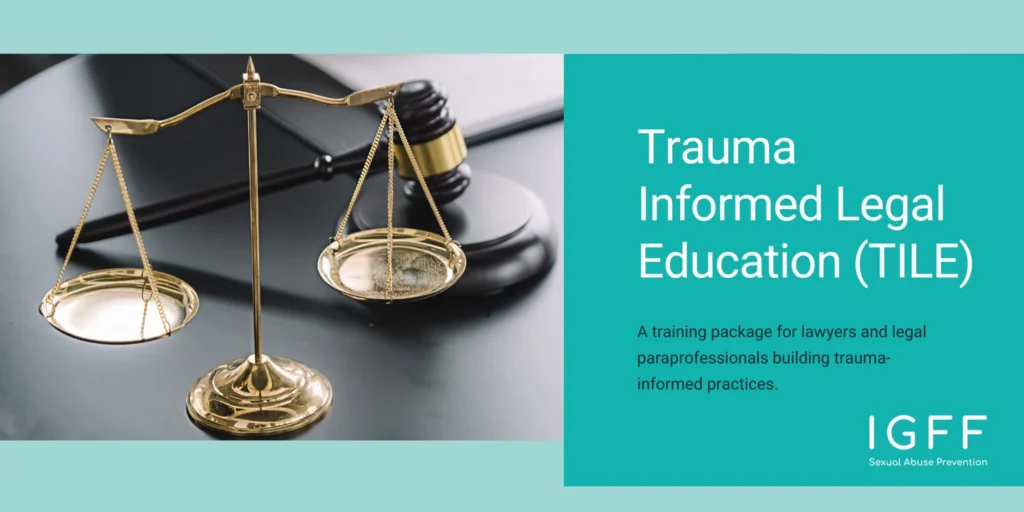PRACTICAL TIPS FOR TRAUMA-INFORMED LEGAL PRACTICE
Lessons from work with victim-Survivors of institutional abuse
The TILE program provides learning that we consider satisfies CPD requirements for legal practitioners across most Australian states and territories, as we consider it is:
- of significant intellectual or practical content
- focused on matters relating to the practice of law
- conducted by persons who are qualified in the subject covered
- designed to extend your knowledge and skills in areas that are relevant to your practice needs or professional development
Based on the content, length of the training, and expertise of the team developing and delivering the training, we consider this session:
- satisfies the compulsory CPD field “professional skills”, covering a broad range of effective communication skills, and particularly skills to enhance interviewing, giving advice, checking client understanding, and clarifying your role in the course of mediation
- should attract 4 CPD units/points.
In many Australian jurisdictions, CPD activities are not accredited. NSF will provide a certificate of completion to all attendees of this training, which can be used for your CPD record keeping and to demonstrate attendance to your local professional governing body.
If you have any queries about how this training may accord with CPD requirements in your jurisdiction, please reach out to igff@igff.org.au for further information.
Why undertake this course?
Interfacing with legal systems can be stressful and challenging for all clients, but especially for those who have experienced trauma. The impacts of trauma experience may be subtle or obvious, but will almost always affect the legal experience for both clients and practitioners.
When working with this client group, our approach as professionals can make an enormous difference.
By using communication and case management strategies based on the principles of Trauma-Informed Practice, lawyers and legal paraprofessionals can create a safer, more respectful relationship with clients. This doesn’t just foster improved client wellbeing, but also leads to smoother, safer processes and better outcomes for both clients and legal staff.
NSF’s Trauma-Informed Legal Education (TILE) program is designed especially for lawyers and legal paraprofessionals, to address the unique practice challenges arising in the legal world when working with victim-survivors.
NSF’s program has been developed by subject matter experts and informed by research, practice knowledge, and lived experience input from lawyers, casework professionals and people who have experienced institutional abuse trauma.

Who should undertake this course?
Participants are welcome to book as individuals or as a group of practitioners. Please note that group discounts and community legal centre discounts are available – reach out to us at igff@igff.org.au or call 1300 12 44 33 to discuss.
We consider the most effective trauma-informed practice is undertaken via a whole-of-firm approach – anyone involved in documentation, client communication and formation of policy and procedure plays a crucial role in creating a trauma-informed legal practice. We encourage firms and legal centres booking in for training to consider inviting a range of staff to participate.
This training draws particular lessons from the experiences of primary or secondary victim-Survivors and whistleblowers pursuing civil litigation claims under abuse law, and will be especially useful to plaintiff lawyers working in abuse law civil litigation. However the principles and skills taught are applicable to a wide range of practice areas.
We also welcome attendees including:
- Current or aspiring legal professionals, including solicitors, barristers, and paralegal and administrative staff;
- Practitioners acting on behalf of Survivors in broader areas of litigation connected with not only abuse law but adjacent areas of law, such as medical negligence or workplace injury, where clients have experienced institutional betrayal
- Practitioners working in criminal law prosecution, whether connected with institutional abuse or with sexual assault cases more broadly
- Practitioners working or volunteering in community legal centres

What you’ll learn
Attending this program will give you access to:
- a live training session of approximately 4 hours’ duration (the length is currently being finalised through the editing process), supported by accompanying slides, delivered by a subject matter expert; and
- an accompanying participant booklet with practice resources and checklists, which participants can keep and use following completion of the training.
Participants in the TILE program will learn about:
- Key concepts needed to understand the internal experiences of trauma Survivors, particularly Survivors of trauma caused by institutions;
- Typical challenges which can arise when trauma Survivors interact with lawyers and legal systems, with explanations of the causes of these challenges
- Introduction to key principles underlying general trauma-informed practice
- Most crucially, and comprising the majority of content: specific guidelines and tips for lawyers working with Survivors, with a focus on concrete actions and processes which can be implemented throughout engagement between client and lawyer/law firm to reduce risks of conflict, dissatisfaction and re-traumatisation and improve the likelihood of a satisfying and meaningful litigation experience for clients

Continuing professional development (CPD)
The TILE program provides learning that we consider satisfies CPD requirements for legal practitioners across most Australian states and territories
The things we consider for this include:
- of significant intellectual or practical content
- focused on matters relating to the practice of law
- conducted by persons who are qualified in the subject covered
- designed to extend your knowledge and skills in areas that are relevant to your practice needs or professional development
Based on the content, length of the training, and expertise of the team developing and delivering the training, we consider this session:
- satisfies the compulsory CPD field “professional skills”, covering a broad range of effective communication skills, and particularly skills to enhance interviewing, giving advice, checking client understanding, and clarifying your role in the course of mediation
- should attract 4 CPD units/points.
In many Australian jurisdictions, CPD activities are not accredited.
NSF will provide a certificate of completion to all attendees of this training, which can be used for your CPD record keeping and to demonstrate attendance to your local professional governing body. If you have any queries about how this training may accord with CPD requirements in your jurisdiction, please reach out to igff@igff.org.au for further information.
Course Creators
Hannah Aroni
Course Lead DesignerAfter completing her BA/LLB(Hons), Hannah worked as a judges’ associate and legal researcher at the Victorian Court of Appeal and the Family Court of Australia before completing her Masters in Social Work. Hannah’s experience includes roles focused on casework, advocacy, education design and teaching for both university students and workers across a range of industries, counselling, and service reform. Hannah has a particular interest in disability and neurodiversity, and served for more than 5 years as one of the few non-autistic co-directors of A_tistic, a majority-autistic-led theatre, education and consultancy organisation. As a Senior Caseworker with IGFF, she is dedicated to supporting victim-survivors with a focus on collaborative, accessible approaches adapted to each person.
Karen Spitz
Co-Design MemeberKaren Spitz is Shine Lawyers’ dedicated Lead Counsellor. In her role she provides mental health support to abuse law clients, as well as embedding trauma-informed practices across Shine Lawyers’ services. Karen gained qualifications in first legal practice and then counselling and has experience working with those who have been institutionalised in the justice and health systems, including work supporting members of the Stolen Generation. In addition to her work with Shine, Karen teaches trauma informed legal practice, and delivers trauma-informed yoga workshops teaching nervous system regulation and embodiment.
Charlotte Evans
Co-Design MemeberCharlotte Evans is a Special Counsel for East Coast Injury Lawyers. With almost two decades of legal practice experience across the UK and Australia in both larger and boutique firms, Charlotte has experience transitioning from general personal injury work to abuse law plaintiff litigation, and has a detailed understanding of the challenges unique to abuse law and the learning curve involved in developing a more trauma-informed legal practice approach.
PBD
Co-Design MemeberPBD has worked with IGFF for almost 10 years, presenting evidence to the Royal Commission into Institutional Responses to Child Sexual Abuse Case Study 28 – Ballarat Diocese. Using his own experiences of criminal prosecution and civil litigation, BPD has contributed lived-experience knowledge to the development of this training and continues to lobby for improved harm prevention, effective child safety and trauma-informed responses to Victim-Survivors.
Discount pricing is available to group and community legal centres. Please get in touch with igff@igff.org.au to speak with us about it.
Next Workshop
Registration will take you to an external site.
Training Information
Cost: $500pp* (plus GST) per person.
Community Legal Centre pricing is available. Please see https://events.humanitix.com/host/national-survivors-foundation for further details
Duration: 4 hours
Date: TBC
Delivery: Online
Register: https://events.humanitix.com/host/national-survivors-foundation
Refund policy: There are no refunds for this event. You are welcome to send someone in your place or attend a future session. Please let the event organised know if someone else is attending in your place or if you wish to attend a future session. There are no refunds for no shows.

